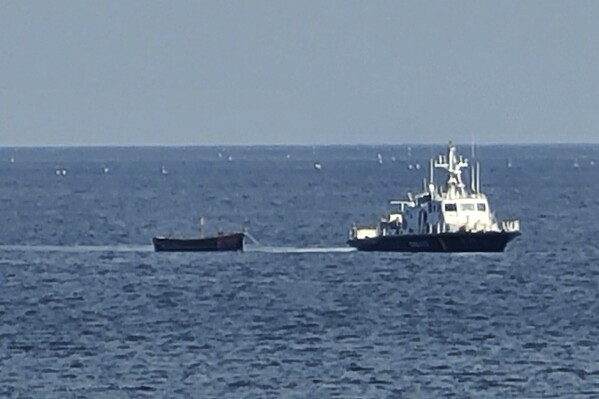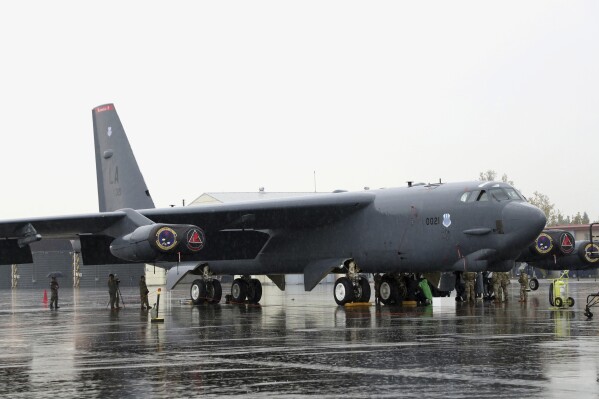South Korea, US and Japan condemn North Korea’s alleged supply of munitions to Russia
SEOUL, South Korea (AP) — South Korea, the U.S. and Japan strongly condemned what they call North Korea’s supply of munitions and military equipment to Russia, saying Thursday that such weapons shipments sharply increase the human toll of Russia’s war in Ukraine.
A joint statement by the top diplomats of South Korea, the U.S. and Japan came days after Russia’s foreign minister scoffed at a recent U.S. claim that his country received munitions from North Korea, saying that Washington has failed to prove the allegation.
“We will continue to work together with the international community to expose Russia’s attempts to acquire military equipment from (North Korea),” said the joint statement by South Korean Foreign Minister Park Jin, U.S. Secretary of State Antony Blinken and Japanese Foreign Minister Yoko Kamikawa.
“Such weapons deliveries, several of which we now confirm have been completed, will significantly increase the human toll of Russia’s war of aggression,” it said.
 4 suspected North Korean defectors found in a small boat in South Korean waters
4 suspected North Korean defectors found in a small boat in South Korean waters
 South Korea, US and Japan hold first-ever trilateral aerial exercise in face of North Korean threats
South Korea, US and Japan hold first-ever trilateral aerial exercise in face of North Korean threats
 Army private who fled to North Korea charged with desertion, held by US military, officials tell AP
Army private who fled to North Korea charged with desertion, held by US military, officials tell AP
North Korea and Russia — both locked in separate confrontations with the U.S. and its allies — have recently taken steps to strengthen their defense and other ties. Speculation about North Korea’s provision of conventional arms to refill Russia’s exhausted weapons stores flared last month, when North Korean leader Kim Jong Un traveled to Russia’s Far East to meet President Vladimir Putin and visit key military facilities.
The U.S., South Korea and others believe North Korea seeks to receive sophisticated weapons technologies to enhance its nuclear program in exchange for its munitions supply.
During his visit to Pyongyang last week, Russian Foreign Minister Sergey Lavrov said in a reception speech that Russia valued North Korea’s “unwavering” support for its war on Ukraine. He also proposed regular security talks with North Korea and China to cope with what he described as increasing U.S.-led regional military threats.
After returning to Moscow, Lavrov shrugged off the U.S. accusation of the North Korean arms transfers, saying that “the Americans keep accusing everyone.”
“I don’t comment on rumors,” he said, according to Russian state media.
Earlier this month, the White House said that North Korea had delivered more than 1,000 containers of military equipment and munitions to Russia. The White House released images that it said showed the containers were loaded onto a Russian-flagged ship before being moved via train to southwestern Russia.
Thursday’s Seoul-Washington-Tokyo statement said the three countries are closely monitoring for any materials that Russia provides to North Korea in support of the North’s military objectives.
“We are deeply concerned about the potential for any transfer of nuclear- or ballistic missile-related technology to (North Korea),” the statement said. It noted arms transfers to and from North Korea would violate U.N. Security Council resolutions, which Russia, a permanent Security Council member, previously voted for.
Since last year, North Korea has performed more than 100 missile tests, many of them meant to simulate nuclear attacks on South Korea and the U.S. Experts say Russia’s provision of high-tech technologies would help Kim build much more reliable nuclear weapons systems targeting his country’s rivals.
In response to North Korea’s growing nuclear capability, the U.S. and South Korea have been expanding their regular military drills and restoring some training with Japan. Earlier this week, the South Korean, U.S. and Japanese militaries conducted their first-ever trilateral aerial exercise near the Korean Peninsula.
On Thursday, South Korea’s navy said it has been holding a large-scale maritime drill off the Korean Peninsula’s west coast this week as part of broader annual military training. This year’s maritime drill, which involves live-firing exercises, drew U.S. military helicopters and patrol aircraft as well, according to a navy statement.
North Korea didn’t immediately comment on the drill. But it has previously slammed U.S-South Korean exercises as invasion rehearsals and responded with missile tests.
Disclaimer: The copyright of this article belongs to the original author. Reposting this article is solely for the purpose of information dissemination and does not constitute any investment advice. If there is any infringement, please contact us immediately. We will make corrections or deletions as necessary. Thank you.






